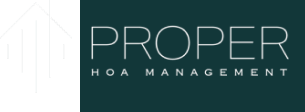Homeowners Associations (HOAs) serve as the backbone of many residential communities, ensuring that neighborhoods are well-maintained, property values are protected, and community standards are upheld.
However, when an HOA is self-managed—meaning it is run entirely by volunteer board members without the assistance of a professional management company—the association can face numerous challenges.
While the allure of autonomy and cost savings may initially appeal to some communities, the risks associated with self-management can far outweigh these perceived benefits.
At Proper HOA Management, we help guide HOAs to success and let them avoid the most common pitfalls found in self management. Let’s take a look at the five biggest risks of a self-managed HOA.
General Mismanagement
One of the most significant risks of self-managed HOAs is the potential for mismanagement. Board members, though often well-intentioned, may lack the expertise, time, or resources necessary to effectively manage the many responsibilities that come with running an association. After all, a volunteer does not make an expert.
From handling property maintenance and repairs to managing finances and communicating with homeowners, the tasks required of an HOA board are both complex and time-consuming.
Without the guidance of a professional management company, board members may inadvertently overlook important duties or make decisions that are not in the best interest of the community.
Mismanagement can lead to a range of issues, including deferred maintenance, financial instability, reduced property value, and a general decline in the quality of life for residents. Furthermore, when board members are tasked with too many responsibilities, the risk of burnout increases, which can further exacerbate the problem.
Non-Compliance with Laws and Regulations
HOAs are subject to a wide range of federal, state, and local laws and regulations. These legal requirements can be complex, and failure to comply with them can result in significant penalties for the association. Self-managed HOAs often struggle to stay informed about the latest legal developments and may not fully understand their obligations under the law.
For example, some HOAs may want to maintain reserve funds to cover the cost of major repairs and replacements. Although reserve funds aren’t a legal requirement, financial mismanagement can lead to legal pitfalls. If a self-managed HOA fails to adequately fund these reserves, the association could face legal action, fines, or even the risk of insolvency.
Changes in laws or regulations may occur frequently, making it difficult for self-managed boards to keep up. A professional management company like Proper HOA Management,, has the expertise and resources to ensure that the association remains in compliance with all applicable laws.
Communication Breakdown
Effective communication is crucial for the success of any organization, including HOAs. In a self-managed HOA, board members are responsible for communicating with homeowners, vendors, and other stakeholders. However, without proper systems in place, communication can easily break down.
Poor communication can lead to misunderstandings, frustration among homeowners, and a lack of transparency within the association.
For example, if the board fails to send out notices in a timely manner or does not respond to homeowner inquiries, trust in the association may erode. A professional management company can help ensure that communication is handled efficiently and effectively, maintaining transparency and fostering a positive relationship between the board and the community.
Legal Risks and Liability
HOAs face a variety of legal risks, including the possibility of lawsuits from homeowners or third parties. Without proper insurance coverage and legal expertise, a self-managed HOA may be ill-equipped to handle these risks. Board members may not fully understand the insurance policies needed to protect the association or may inadvertently expose the HOA to liability through their actions.
In the event of a lawsuit, the financial and reputational damage to the association can be severe. Professional management companies are well-versed in the legal aspects of HOA management and can help ensure that the association is adequately protected against potential risks.
Interpersonal Conflicts and Community Discord
In a self-managed HOA, the close-knit nature of the board can sometimes lead to interpersonal conflicts. When board members are also neighbors, disagreements can become personal, making it difficult to resolve issues objectively. These conflicts can create tension within the board and the broader community, undermining the association’s ability to function effectively.
A professional management company can act as a neutral mediator, helping to resolve conflicts and maintain harmony within the community. By keeping emotions out of the equation, a management company can ensure that decisions are made in the best interest of the association as a whole.
Avoid Major Management Pitfalls With Proper HOA Management
While self-management may seem like an appealing option for some HOAs, the risks associated with this approach are significant.
From mismanagement and legal compliance issues to communication breakdowns and interpersonal conflicts, self-managed HOAs face numerous challenges that can jeopardize the well-being of the community. By choosing to work with Proper HOA Management, associations can mitigate these risks and ensure that their community is well-managed, compliant with the law, and positioned for long-term success.
Contact us today to learn more about our services in Dallas!


